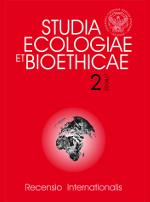Człowiek i przyroda w nauce chrześcijańskiego Wschodu
Man and Nature in the Teaching of the Christian East
Author(s): Janusz AptacySubject(s): Systematic Theology, Eastern Orthodoxy
Published by: Wydawnictwo Naukowe Uniwersytetu Kardynała Stefana Wyszyńskiego w Warszawie
Keywords: humans;nature;Orthodox Christianity;religion and ecology;
Summary/Abstract: This article speaks of the relation between man and the rest of the created world. This is a subject that is being taken up more and more frequently by ecologists, by philosophers and theologians. Man is in relation to the universe above all because of their common beginning. For everything, human beings included came into being "from nothing" (ex nihilo). Secondly: all of creation, even if to a different degree, is subject to the laws of limitations. Thirdly: all of the universe, which means also a man living in it, is called development and liberation from the burdening of evil, in order to participate in the freedom and glory of the children of God (cfr. R om 8:21). The subject of the relation of man with the rest of the created world was dear to the Fathers of the Church, especially in the East. The heritage of the Eastern Church Fathers has been taken up mainly by Orthodox theologians. But there are also Catholic theologians that take up the subject of the relation between man and the universe. Here one should name above all K. Rahner, H.U. von Balthasar and, among Polish theologians: W. Hryniewicz. Among the contemporary Orthodox theologians that speak of the relation between man and the universe, we find O. Clément. For him, relations with God the Creator and Savior are of importance. Upon these relations depend on other ones: with other people and with the universe. If one does not take this into consideration, one's knowledge of the man himself would be incomplete. Relations between man and the universe can be twofold: man can remain on the outside of the reality which shows itself to his eyes or he can be inserted into this reality, which he shall observe as an organic all-embracing unity. Visible nature, as O. Clément writes, is a book rich in content, which speaks of life on Earth and after death. It is only necessary to know how to make use of this book. Man created in the "image and likeness" of God is marked by divinity and participates in the divine intellect and, by means of his body, is in relation to the material world. He concentrates in himself what is spiritual and what is material. All of the created universe can participate in divine "energies" only through man, who is "priest and caretaker" of the universe. It is the duty of man to read the first revelation (that is the world) and to "realize the ontological glorification of all things". But man, because of original sin, has led to a true cosmic catastrophe, to a darkening of the modality of paradise and to the appearance of a new way of universal existence, marked by sin. The man also ceased to understand the true world, the way God created it and sustains it in His glory. Creation, just as Rs Creator, does not thrust itself upon man, who sees the universe through the prism of his fall which in such a manner obscures and covers it, that he becomes more and more obdurate to the action of God.
Journal: Studia Ecologiae et Bioethicae
- Issue Year: 2/2004
- Issue No: 1
- Page Range: 327-348
- Page Count: 22
- Language: Polish

